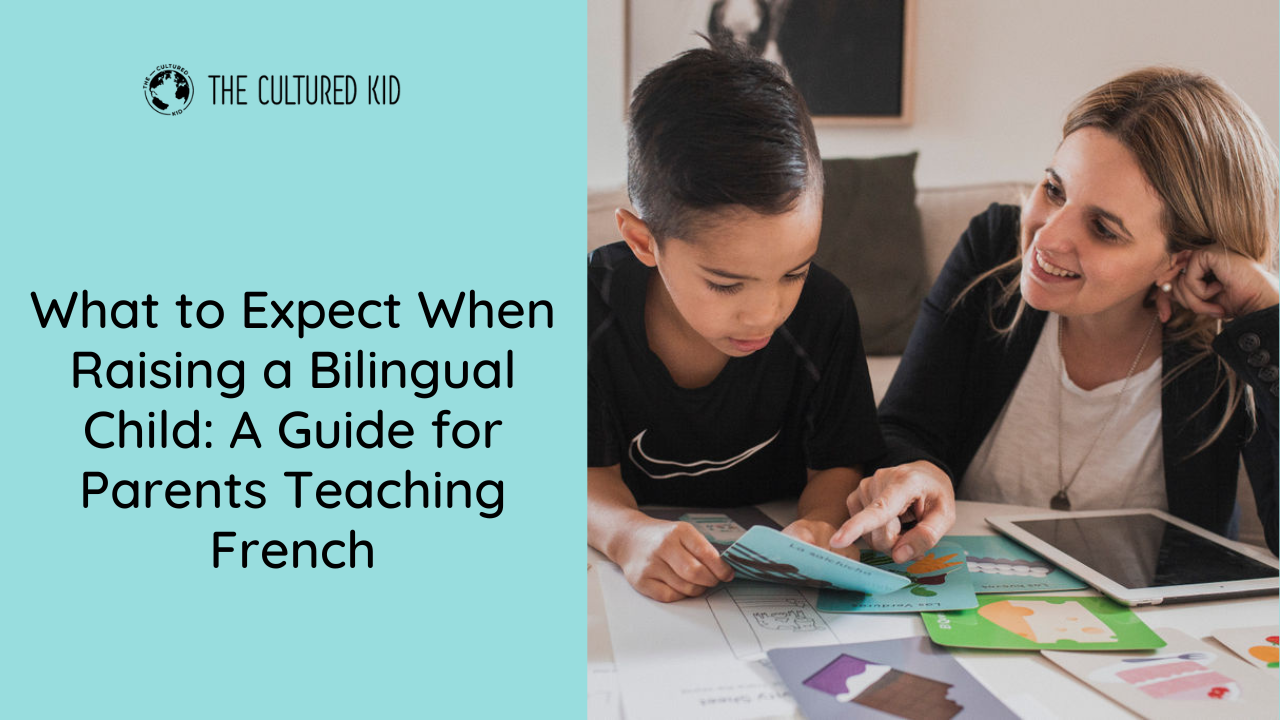What to Expect When Raising a Bilingual Child: A Guide for Parents Teaching French

What to Expect When Raising a Bilingual Child: A Guide for Parents Teaching French
Embarking on the journey of raising a bilingual child can seem daunting, especially if you're not a native speaker yourself. Whether you have questions about teaching your child French alongside English or concerns about when and how to start, we've got you covered. In this guide, we'll explore valuable tips and advice from Madalena Xanthopoulou, an educator and trilingual mother, on what to expect when raising a bilingual child with a focus on teaching French to kids. Let's dive in!
Set a Fluency Goal
Before delving into language exposure, it's crucial to determine your fluency goals for your child. Ask yourself: Do you want them to recognize, understand, speak, or master French? This clarity will help you gauge the necessary language exposure and the effort required. Some parents are content with their children simply understanding French, while others aim for fluency to enable studying or living in a Francophone country. Consider your vision and create an action plan to achieve your language goals. Remember, making language learning enjoyable for your kids is key to building a strong foundation for a lifetime of learning.
Native Speaking Parents Need to Put in the Work
Being a native speaker of a language doesn't automatically ensure your child will effortlessly acquire that language. It takes more than nationality to instill a cultural and linguistic connection. Active effort is required to immerse your child in the language. Language exposure in daily life is essential. So, if you're an Italian parent, for example, don't rely solely on heritage or short visits to Italy. Instead, actively work toward the language goal by incorporating French into your family's routines and activities.
Reading - A Key Strategy for Language Learning
When it comes to teaching your child a second language, reading is a highly effective strategy. Madalena emphasizes the power of reading to children in the target language. Literacy skills acquired in one language are transferable to another, providing valuable support for your child's language journey. If your child can already read in English, they will likely be curious about reading in French. They can apply their decoding skills to the new language, facilitating their language acquisition process.
Overcoming Doubt and Impatience
It's common for parents raising bilingual children to experience moments of doubt and impatience. You might feel like you're failing when you don't see immediate results. However, remember that raising a bilingual child is a marathon, not a sprint. Stay focused on the long-term outcome, be patient, and trust the process. Madalena suggests writing down your language goals for your child and revisiting them during moments of doubt. Recognize that language acquisition takes time, and small steps consistently add up to significant progress. Celebrate every milestone along the way.
Build Rituals
Daily routines and rituals play a vital role in a child's learning process. They provide an excellent opportunity to incorporate language lessons into your child's daily life. For example, you can sing a simple and repetitive song about brushing teeth during their teeth-brushing time. By linking specific songs or activities to daily routines, you create triggers that associate the French language with familiar actions, making language learning more engaging and natural.
When to Introduce a Second Language
Parents often wonder when the ideal time is to introduce a second language to their child. According to Madalena, the earlier, the better. Even during pregnancy, you can expose your child to different sounds and languages through music and various experiences. From newborn to preschool age, focus on engaging your child's senses. Make the language tangible, something they can touch and taste. Research indicates that the best time to learn languages is before the age of seven
In conclusion, raising a bilingual child and teaching them French is an incredible journey that offers numerous benefits and opportunities. Remember to set clear fluency goals, embrace the importance of active engagement, and make language learning enjoyable for your child. Reading, incorporating rituals, and starting early are all valuable strategies to foster language acquisition. During moments of doubt, stay patient, celebrate small victories, and trust in the long-term process. With dedication and a supportive environment, you can provide your child with the gift of bilingualism and open doors to a world of language, culture, and endless possibilities. Bonne chance! (Good luck!)
GRAB OUR FREE 'KIDS LANGUAGES MADE EASY' GUIDE
FOR NON-NATIVE PARENTS!
Discover how you can run consistent language lessons, that are fun and engaging and help your kids make the progress they deserve!
Even if you're not fluent!
We hate SPAM. We will never sell your information, for any reason.








